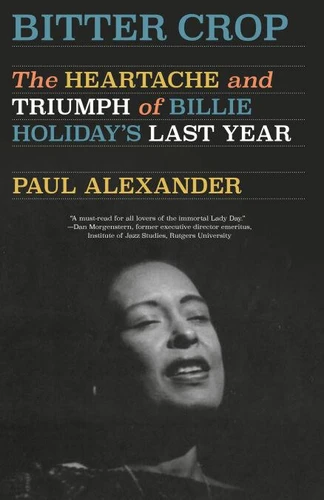Bitter Crop. The Heartache and Triumph of Billie Holiday's Last Year
Par :Formats :
Disponible dans votre compte client Decitre ou Furet du Nord dès validation de votre commande. Le format ePub protégé est :
- Compatible avec une lecture sur My Vivlio (smartphone, tablette, ordinateur)
- Compatible avec une lecture sur liseuses Vivlio
- Pour les liseuses autres que Vivlio, vous devez utiliser le logiciel Adobe Digital Edition. Non compatible avec la lecture sur les liseuses Kindle, Remarkable et Sony
- Non compatible avec un achat hors France métropolitaine
 , qui est-ce ?
, qui est-ce ?Notre partenaire de plateforme de lecture numérique où vous retrouverez l'ensemble de vos ebooks gratuitement
Pour en savoir plus sur nos ebooks, consultez notre aide en ligne ici
- Nombre de pages368
- FormatePub
- ISBN978-0-593-31591-0
- EAN9780593315910
- Date de parution13/02/2024
- Protection num.Adobe DRM
- Taille12 Mo
- Infos supplémentairesepub
- ÉditeurVintage
Résumé
A revelatory look at the tumultuous life of a jazz legend and American cultural icon"A book written as only one artist could view another, with insight and sincere compassion." -Sandra Cisneros, best-selling author of Woman Without ShameIn the first biography of Billie Holiday in more than two decades, Paul Alexander-author of heralded lives of Sylvia Plath and J. D. Salinger-gives us an unconventional portrait of arguably America's most eminent jazz singer.
He shrewdly focuses on the last year of her life-with relevant flashbacks to provide context-to evoke and examine the persistent magnificence of Holiday's artistry when it was supposed to have declined, in the wake of her drug abuse, relationships with violent men, and run-ins with the law. During her lifetime and after her death, Billie Holiday was often depicted as a down-on-her-luck junkie severely lacking in self-esteem.
Relying on interviews with people who knew her, and new material unearthed in private collections and institutional archives, Bitter Crop-a reference to the last two words of Strange Fruit, her moving song about lynching-limns Holiday as a powerful, ambitious woman who overcame her flaws to triumph as a vital figure of American popular music.
He shrewdly focuses on the last year of her life-with relevant flashbacks to provide context-to evoke and examine the persistent magnificence of Holiday's artistry when it was supposed to have declined, in the wake of her drug abuse, relationships with violent men, and run-ins with the law. During her lifetime and after her death, Billie Holiday was often depicted as a down-on-her-luck junkie severely lacking in self-esteem.
Relying on interviews with people who knew her, and new material unearthed in private collections and institutional archives, Bitter Crop-a reference to the last two words of Strange Fruit, her moving song about lynching-limns Holiday as a powerful, ambitious woman who overcame her flaws to triumph as a vital figure of American popular music.
A revelatory look at the tumultuous life of a jazz legend and American cultural icon"A book written as only one artist could view another, with insight and sincere compassion." -Sandra Cisneros, best-selling author of Woman Without ShameIn the first biography of Billie Holiday in more than two decades, Paul Alexander-author of heralded lives of Sylvia Plath and J. D. Salinger-gives us an unconventional portrait of arguably America's most eminent jazz singer.
He shrewdly focuses on the last year of her life-with relevant flashbacks to provide context-to evoke and examine the persistent magnificence of Holiday's artistry when it was supposed to have declined, in the wake of her drug abuse, relationships with violent men, and run-ins with the law. During her lifetime and after her death, Billie Holiday was often depicted as a down-on-her-luck junkie severely lacking in self-esteem.
Relying on interviews with people who knew her, and new material unearthed in private collections and institutional archives, Bitter Crop-a reference to the last two words of Strange Fruit, her moving song about lynching-limns Holiday as a powerful, ambitious woman who overcame her flaws to triumph as a vital figure of American popular music.
He shrewdly focuses on the last year of her life-with relevant flashbacks to provide context-to evoke and examine the persistent magnificence of Holiday's artistry when it was supposed to have declined, in the wake of her drug abuse, relationships with violent men, and run-ins with the law. During her lifetime and after her death, Billie Holiday was often depicted as a down-on-her-luck junkie severely lacking in self-esteem.
Relying on interviews with people who knew her, and new material unearthed in private collections and institutional archives, Bitter Crop-a reference to the last two words of Strange Fruit, her moving song about lynching-limns Holiday as a powerful, ambitious woman who overcame her flaws to triumph as a vital figure of American popular music.








